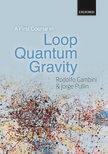 A First Course in Loop Quantum Gravity
A First Course in Loop Quantum Gravity
Contents
-
-
-
-
-
-
-
-
-
-
-
-
-
10.1 Black hole entropy 10.1 Black hole entropy
-
10.1.1 Black hole thermodynamics 10.1.1 Black hole thermodynamics
-
10.1.2 Hawking radiation 10.1.2 Hawking radiation
-
10.1.3 Black hole entropy in loop quantum gravity 10.1.3 Black hole entropy in loop quantum gravity
-
-
10.2 The master constraint and uniform discretizations 10.2 The master constraint and uniform discretizations
-
10.2.1 The master constraint program 10.2.1 The master constraint program
-
10.2.2 Uniform discretizations 10.2.2 Uniform discretizations
-
-
10.3 Spin foams 10.3 Spin foams
-
10.3.1 Path integrals in quantum mechanics 10.3.1 Path integrals in quantum mechanics
-
10.3.2 Path integrals in general relativity and spin foams 10.3.2 Path integrals in general relativity and spin foams
-
-
10.4 Possible observational effects? 10.4 Possible observational effects?
-
10.4.1 Quantum gravity and the arrival time of gamma rays from gamma ray bursts 10.4.1 Quantum gravity and the arrival time of gamma rays from gamma ray bursts
-
10.4.2 Limitations in measurements of times and lengths 10.4.2 Limitations in measurements of times and lengths
-
-
10.5 The problem of time 10.5 The problem of time
-
10.5.1 Evolving constants of the motion 10.5.1 Evolving constants of the motion
-
10.5.2 The conditional probabilities interpretation 10.5.2 The conditional probabilities interpretation
-
10.5.3 Conditional probabilities with evolving constants of the motion 10.5.3 Conditional probabilities with evolving constants of the motion
-
Further reading Further reading
-
-
-
-
-
Cite
Abstract
This chapter discusses several topics in which loop quantum gravity techniques have been applied. These include black hole entropy in the context of black hole thermodynamics and how loop quantum gravity accounts for the entropy; the master constraint technique and the closely related uniform discretizations as a means of dealing with some of the problems of the Hamiltonian constraint; the spin foam techniques to treat the covariant quantization of gravity via path integral techniques; the possibility that observational effects could arise in the dispersion of the light that arrives from gamma ray bursts; possible limitations in the measurement of times and distances; and the problem of time in quantum gravity and recent proposals to deal with it.
Sign in
Personal account
- Sign in with email/username & password
- Get email alerts
- Save searches
- Purchase content
- Activate your purchase/trial code
- Add your ORCID iD
Purchase
Our books are available by subscription or purchase to libraries and institutions.
Purchasing information| Month: | Total Views: |
|---|---|
| October 2022 | 1 |
| December 2022 | 1 |
| March 2023 | 6 |
| April 2023 | 2 |
| July 2023 | 5 |
| August 2023 | 3 |
| November 2023 | 6 |
| February 2024 | 2 |
| April 2024 | 2 |
| May 2024 | 3 |
| June 2024 | 2 |
| July 2024 | 2 |
| September 2024 | 2 |
| October 2024 | 2 |
| March 2025 | 1 |

Get help with access
Institutional access
Access to content on Oxford Academic is often provided through institutional subscriptions and purchases. If you are a member of an institution with an active account, you may be able to access content in one of the following ways:
IP based access
Typically, access is provided across an institutional network to a range of IP addresses. This authentication occurs automatically, and it is not possible to sign out of an IP authenticated account.
Sign in through your institution
Choose this option to get remote access when outside your institution. Shibboleth/Open Athens technology is used to provide single sign-on between your institution’s website and Oxford Academic.
If your institution is not listed or you cannot sign in to your institution’s website, please contact your librarian or administrator.
Sign in with a library card
Enter your library card number to sign in. If you cannot sign in, please contact your librarian.
Society Members
Society member access to a journal is achieved in one of the following ways:
Sign in through society site
Many societies offer single sign-on between the society website and Oxford Academic. If you see ‘Sign in through society site’ in the sign in pane within a journal:
If you do not have a society account or have forgotten your username or password, please contact your society.
Sign in using a personal account
Some societies use Oxford Academic personal accounts to provide access to their members. See below.
Personal account
A personal account can be used to get email alerts, save searches, purchase content, and activate subscriptions.
Some societies use Oxford Academic personal accounts to provide access to their members.
Viewing your signed in accounts
Click the account icon in the top right to:
Signed in but can't access content
Oxford Academic is home to a wide variety of products. The institutional subscription may not cover the content that you are trying to access. If you believe you should have access to that content, please contact your librarian.
Institutional account management
For librarians and administrators, your personal account also provides access to institutional account management. Here you will find options to view and activate subscriptions, manage institutional settings and access options, access usage statistics, and more.